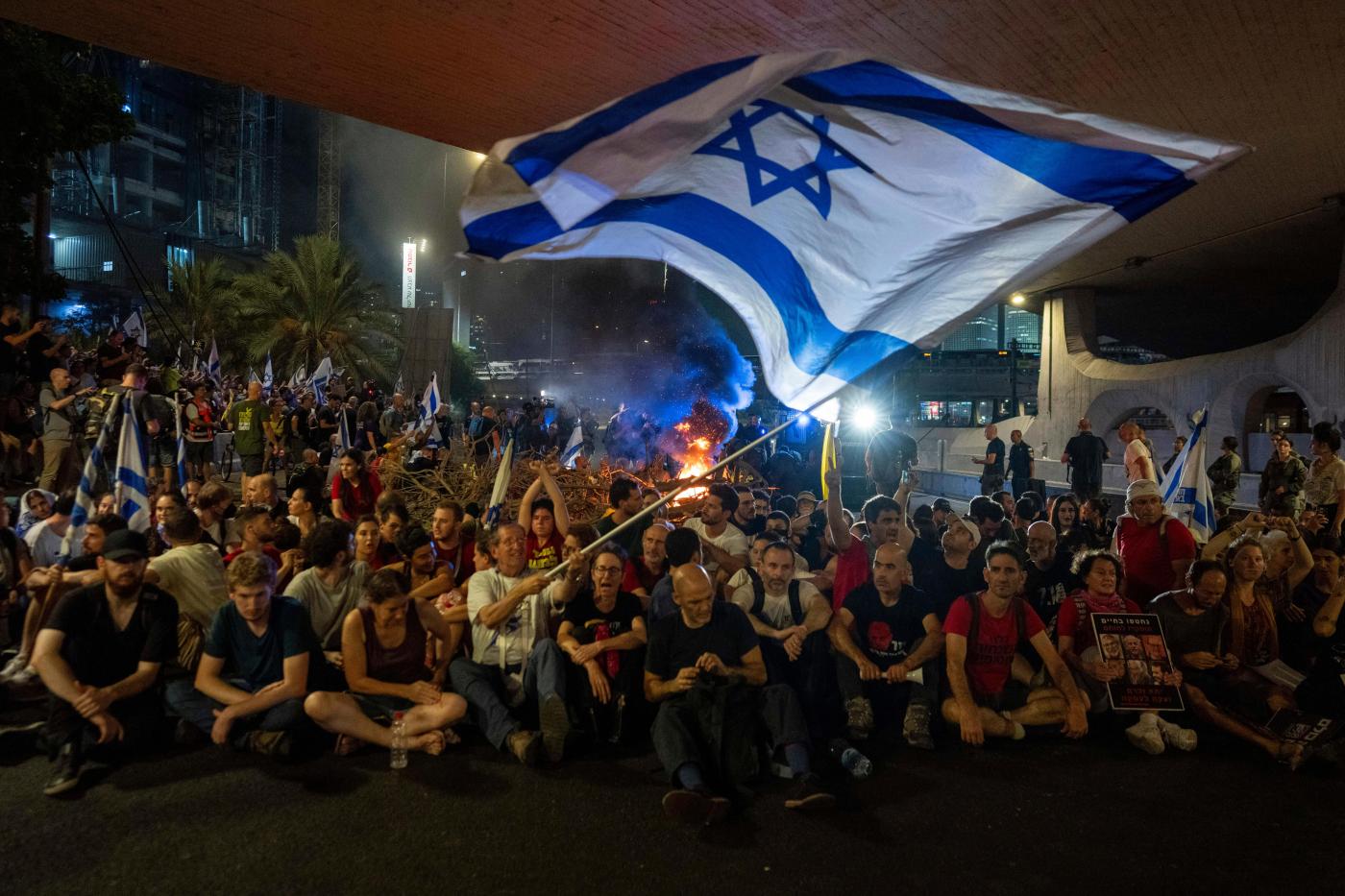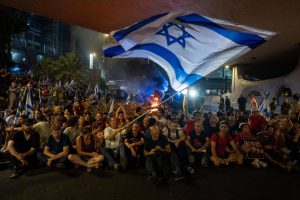
Could mass protests in Israel over the hostages persuade Netanyahu to agree to a cease-fire deal?
By TIA GOLDENBERG Associated Press
TEL AVIV, Israel (AP) — Israelis were plunged into grief and anger this weekend after the military said six hostages were killed by their captors in Gaza just as troops were closing in on their location. The rage sparked massive protests and a general strike — the most intense domestic pressure on Israeli Prime Minister Benjamin Netanyahu since the start of the war nearly 11 months ago.
Many Israelis blame Netanyahu for the mounting number of dead hostages and are calling for a cease-fire agreement to free the remaining roughly 100 captives — even if that means ending the conflict. Sunday’s demonstrations were the largest show of support for a hostage deal since Oct. 7, when Hamas-led terrorists stormed into Israel and kidnapped 250 people. Hamas has been designated as a terrorist organization by the United States, Canada and the European Union.
But Netanyahu has faced fierce pressure to reach a cease-fire agreement before, from key governing partners to top security officials and even Israel’s most important international ally, the U.S. Yet a deal to wind down the war in Gaza remains elusive.
Here’s a look at how the public outcry in Israel could affect Netanyahu’s next moves in the war:
Netanyahu’s position
Throughout the war, critics have claimed Netanyahu has put his political survival above all else, including the fate of the hostages. His rule relies on support from two ultranationalist parties that were once at the fringes of Israeli politics but now hold key positions in government.
Headed by Finance Minister Bezalel Smotrich and National Security Minister Itamar Ben-Gvir, they oppose any deal that ends the war or sets free Palestinian prisoners convicted of killing Israelis. They have vowed to topple the government should Netanyahu agree to a cease-fire — a step that would trigger elections that could remove Netanyahu from office.
“What he cares about is his political survival,” said Reuven Hazan, a political scientist at Jerusalem’s Hebrew University. “His political survival with Ben-Gvir and Smotrich doesn’t allow him to end the war and bring back the hostages.”
Netanyahu blames Hamas for the lack of a deal.
Looming over the prime minister is also his ongoing trial on corruption charges. If Netanyahu is voted out of power, he will lose his platform to rail against the judicial system, which he accuses of being biased. He also wouldn’t be able to move ahead with his government’s planned changes to the legal system that critics say could affect the trial and help him avoid a conviction.
Netanyahu says he has the country’s best interests in mind and insists that the military operation in Gaza is the best way to bring about the hostages’ freedom. He also wants any deal to keep Israeli troops in two strips of land in Gaza, and reaffirmed his insistence that he will never agree to a withdrawal from one of those areas on Monday.
Hamas has rejected those demands as dealbreakers — and the condition has prompted clashes with Netanyahu’s own defense minister, who says a deal that frees the hostages should be a priority.
As the toll of the war in Gaza has mounted — with tens of thousands killed and whole swaths of the territory decimated — Israel has become increasingly isolated internationally. On Monday, when asked if Netanyahu was doing enough to negotiate a deal, U.S. President Joe Biden responded, “No.”
Biden, who has never seen eye to eye with the Israeli leader even though their nations are close allies, has grown increasingly critical of his counterpart’s leadership. But the timing on Monday’s remark was particularly pointed, coming as it did after the demonstrations and outpouring of grief for the hostages.
The largest show of support for a hostage deal
Many Israelis accuse Netanyahu of obstructing a deal to stay in power and say that by not ending the war, he is putting the lives of the hostages in danger.
“Hamas was the one that pulled the trigger, but Netanyahu is the one who sentenced (the hostages) to death,” said an editorial Sunday in the liberal daily Haaretz.
Israel has seen weekly protests in solidarity with the hostages since the start of the war. But over time, as Israelis have tried to return to a semblance of normalcy or have been preoccupied by fears of a regional war with Iran or the militant group Hezbollah, the protests have dwindled in size. That has eased pressure on Netanyahu and talks toward a deal have repeatedly fizzled.
But on Sunday, hundreds of thousands of people poured into central Tel Aviv, banging drums and chanting “Deal, now!” About 100 hostages remain in captivity in Gaza, roughly a third of them said to be dead. Israel and Hamas have been mulling a three-phased proposal that would set them free and end the war.
It was the largest demonstration Israel has seen at least since before the war, when Israelis took the streets weekly to protest a plan by Netanyahu to overhaul the judiciary. While the protests coupled with a general strike prompted Netanyahu and his government to walk back or soften some decisions, the overhaul was only put on hold when the war broke out.
The limits of public pressure
The current public outcry has its limits. Sunday’s protest failed to break longstanding political boundaries and appeared to be largely made up of the same liberal, secular Israelis who protested the overhaul and against Netanyahu’s leadership while on trial for alleged corruption. Many of Netanyahu’s supporters say relenting on any position in talks now after the deaths of the six hostages would signal to Hamas that it can reap rewards from such violence.
Similarly, Monday’s strike reflected those same political divisions. Liberal municipalities in central Israel, including Tel Aviv, joined the strike, leading to public daycares and kindergartens closing as well as other services. But other cities, mostly with conservative and religious populations that tend to support Netanyahu, including Jerusalem, did not join the strike. And a labor court cut the strike short by several hours, hobbling its efficacy.
Related Articles
Trudy Rubin: Netanyahu’s betrayal of remaining hostages could drag U.S. into a regional Mideast war
A Palestinian TikTok star who shared details of Gaza life under siege is killed by Israeli airstrike
Israel kills commander in its deadliest West Bank raids since Gaza war began
A baby in Gaza has a strain of polio linked to mistakes in eradication campaign, experts say
Bret Stephens: Can we be a little less selective with our moral outrage?
Without large sustained protests across a broader swath of society, it’s hard to see how Netanyahu will feel enough pressure to change his approach, said Hazan, the political scientist. And so long as his government is stable, he may stick to his demands in the negotiations to appease his coalition and ignore the protests entirely.
Still, relatives of the hostages found killed in Gaza expressed hope that the protests marked a turning point in the war that might force progress on a deal.
In a eulogy for Hersh Goldberg-Polin, an Israeli-American who became one of the most high-profile captives, his father spoke of the emotional resonance the deaths might have.
“For 330 days, mama and I sought the proverbial stone that we could turn over to save you,” Jon Polin said. “Maybe, just maybe, your death is the stone, the fuel, that will bring home the remaining” hostages.
Associated Press writer Zeke Miller contributed from Washington.


